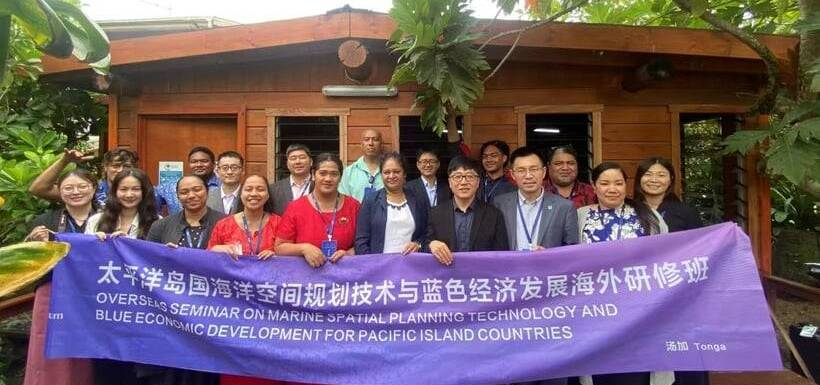News
The side event "Promoting Blue Partnership for a Shared Sustainable Future" was held on 29 June at the 2022 United Nations Ocean Conference in Lisbon, Portugal. During the event, "16 Principles for Blue Partnership" was released, and the full text is now available here. The side event was hosted by the Ministry of Natural Resources of People's Republic of China, in collaboration with China Oceanic Development Foundation, Friends of Ocean Action at the World Economic Forum, etc.
16 Principles for Blue Partnership
The 16 principles aim at establishing Global Blue Partnership through wide consultation and joint contribution, as well as sharing benefits of blue development outcomes, on the basis of voluntary participation and cooperation, to promote the implementation of the 2030 Agenda for Sustainable Development Goals, in particular SDG14 (Conserve and sustainably use the oceans, seas and marine resources for sustainable development) and SDG17 (Strengthen the means of implementation and revitalize the global partnership for sustainable development), and to follow the implementation process of the United Nations Convention on the Law of the Sea, the United Nations Convention on Biological Diversity, the Paris Agreement and other marine related international conventions for promoting the achievement of their commitments and goals. The 16 principles aim to promote joint marine conservation, advocate scientific marine development, enhance marine well-being, create blue prosperity, share blue outcomes and ultimately, build blue homeland globally.
Principle 1: Conserve the Marine Ecosystems
We will take all possible measures to share the objectives of conserving marine ecosystems, prevent and reverse ecosystems degradation, conduct joint marine ecosystems monitoring, support the implementation of nature-based solutions, promote the conservation and restoration of typical marine ecosystems, establish and manage marine protected areas, restore and maintain the health, service functions and biodiversity value of the marine ecosystems.
Objective: To promote the health and resilience of the marine ecosystems.
Principle 2: Tackle Climate Change
We will actively promote the cooperation on climate change actions in ocean field, including strengthen academic research cooperation on topics like sea level change, deoxygenation, acidification, ocean warming and heatwaves, melting of polar ice and snow, and blue carbon sink, and We will actively promote marine climate adaptation and mitigation, jointly carrying out information technology cooperation and sharing on marine observation and monitoring, disaster prediction, prevention and mitigation, fully tapping the disaster prevention and mitigation functions of coastal habitats and other ecosystems, providing jointly public service products, achieving “Ocean Carbon Neutrality”.
Objective: To enhance the capacity of our partners on coping with disasters and climate change in ocean field, and to safeguard the blue homeland of human beings.
Principle 3: Reduce Marine pollution
With practical actions, we share the objectives of minimizing the use of non-essential disposable plastic products, enhancing the management of marine litter and microplastics, controlling and decreasing dumping, reducing marine pollution caused by land activities and ships, limiting the damage of underwater noise to marine life.
Objective: To keep the ocean healthy and clean.
Principle 4: Sustainable Use of Marine Resources
We share the objectives of supporting the conservation and sustainable use of marine biological resources and their genetic resources, carrying out function and value evaluations of marine ecosystem services, exploring multiple ways to promote the value realization of ecological products; encouraging the development of green and sustainable marine aquaculture, support the end of overfishing, illegal, unreported and unregulated fishing and destructive fishing practices, to maintain the sustainable production and safety of the oceans; incentivizing the development of clean renewable energy.
Objective: To promote the sustainable development and use of marine resources under the premise of giving priority to protection.
Principle 5: Thrive Blue Economy
We share the objectives of promoting marine industries in a technologically innovative and environmentally friendly way, upgrading of existing marine industries based on clean production, green technologies, circular economy and best practices, promoting the formation of new blue industries and creating new financial platforms, products, standards and service systems under the framework of Green Financial System and “Sustainable Blue Economy Finance Principles”; exploring healthy coastal tourism community models, creating ocean friendly spaces, realizing coordinated sustainable development of both land and sea areas.
Objective: To tap the future development potential of the blue economy and promote the high-quality sustainable development of global blue economy.
Principle 6: Strengthen Guidance of Technological Innovation
We share the objectives of continuing to support the foundation research in ocean field, taking part in and contributing to the United Nations Decade of Ocean Science for Sustainable Development (2021-2030), enriching the knowledge needed to achieve sustainable development, strengthening the comprehensive cognition and understanding of ocean, facilitating the transformation of marine scientific and technological achievements, and promoting the widespread use of marine knowledge.
Objective: To enhance the cognition of ocean and strengthen the leading role of knowledge to sustainable development.
Principle 7: Implement Integrated Management
We are advocating the implementation of integrated ecosystem-based marine management, through measures including supporting the implementation of the global maritime spatial planning project, reducing and avoiding the adverse impacts of human activities on coastal zones and oceans, and encouraging the exchange of best practices as well as implementation and evaluation studies, making marine management more scientific.
Objective: To advance marine conservation and sustainable development through the implementation of ecosystem-based integrated marine management.
Principle 8: Contribute Solutions
We share the objectives of supporting all parties in coming with best solutions in practice, and encouraging actions to support sustainable ocean development through nature-based solutions, making efforts to conduct the cooperation into solutions contributing to achieve the 2030 Agenda for Sustainable Development Goals, in particular SDG14 and SDG17, bringing positive impact on the health of marine ecosystems and the promotion of blue growth.
Objective: To increase the efficiency of maritime cooperation and the pertinence of solutions.
Principle 9: Reinforce Capacity Building
We share the objectives of supporting small island states, low-and middle-income countries and the least developed countries through human resources training, technical assistance and formulation of marine development planning; encouraging the development of localized blue industries, creating employment opportunities, increasing incomes, improving livelihoods, and enhancing their abilities to produce benefits through sustainable use of marine resources.
Objective: To enhance the capacity for sustainable development of small island states, low-and middle-income countries and the least developed countries.
Principle 10: Adhere toOpenness and Inclusiveness
We share the objectives of promoting the establishment of an open and inclusive global blue partnership, adhering to the principle of seeking common ground while reserving differences, respecting the existence of diversity among partners with different levels of development, different governance models, pluralistic interests and different traditional characteristics, jointly caring for, conserving and using sustainably the oceans, promoting the building of a Marine Community of Shared Future, and jointly advancing the realization of the 2030 Agenda for Sustainable Development Goals.
Objective: To promote the formation of a more open, inclusive and flexible cooperative relationship in ocean field.
Principle 11: Welcome Multi-party Participation
We recognize that the wide participation of multi-stakeholders is the key to advancing global maritime cooperation. We are welcoming governments, intergovernmental organizations, non-governmental organizations, local governments, research institutions, companies and other stakeholders to play an active part in the Global Blue Partnership, as well as providing all kinds of supports.
Objective: To promotebroad, democratic and scientific solutions to problems in ocean field.
Principle 12: Encourage Voluntary Commitments
We are encouraging partners to make voluntary commitments for the Blue Partnership within their respective capabilities, based on their own circumstances, and to contribute the realization of the 2030 Agenda for Sustainable Development Goals.
Objective: To enhance the initiative and enthusiasm of blue partners to deliver on their commitments.
Principle 13: Take Collective Actions
We are willing to work together with all governments and stakeholders, strengthening communication and coordination among partners, promoting common understanding and raising social awareness of the oceans; sharing marine knowledge, best practices, experience, and engaging in cooperative actions in various forms. We welcome all parties to provide financial support and other resource contribution, contributing relevant knowledge to policy making, and addressing problems in ocean field of common concern.
Objective: To strengthen partner cooperative relations, and engage in collective actions in various forms.
Principle 14: Promote Legislative Governance
We are advocating activities among partners in accordance with international, regional, national laws and other relevant institutional frameworks, centered on The United Nations Convention on the Law of the Sea. We are following the principles of achieving shared growth through discussion and collaboration, to make institutional arrangements and projects for the conservation and sustainable use of oceans and marine resources reflect the will and interests of the majority of countries.
Objective: To promote marine governance mechanism more legislative and equitable.
Principle 15: Share Development Outcomes
We are committed to sharing the outcomes of blue development, publishing the information about our activities and its (positive and negative) social, environmental and economic impacts, releasing the progress of the implementation of the principleson the basis of respecting the principle of confidentiality and intellectual property.
Objective: To ensure the openness and transparency of the Blue Partnership, make the outcomes of blue development benefit more people around the world.
Principle 16: Safeguard Intergenerational Equity
While creating social, environmental and economic benefits from the oceans, we should take a full consideration to the rights and opportunities of future generations to use marine resources and enjoy marine space, we have the obligation to preserve a healthy, clean and beautiful blue home for our future generations.
Objective: To promote the intergenerational equity in marine sustainable development.

- Marine Spatial Planning Study Tour 2023 Officially Launched
- President Lv Bin Met with Her Royal Highness of Tonga Pilolevu Tuita in Beijing and Signed a Memorandum of Understanding on Cooperation
- Dialogue eyes key role of youth in RCEP region's growth
- Pan Xinchun Attends the 2022 China Ocean Action Roundtable and Introduces Ten Major Actions



 Home
Home  About Us
About Us  Our Programs
Our Programs  Cooperative Partner
Cooperative Partner